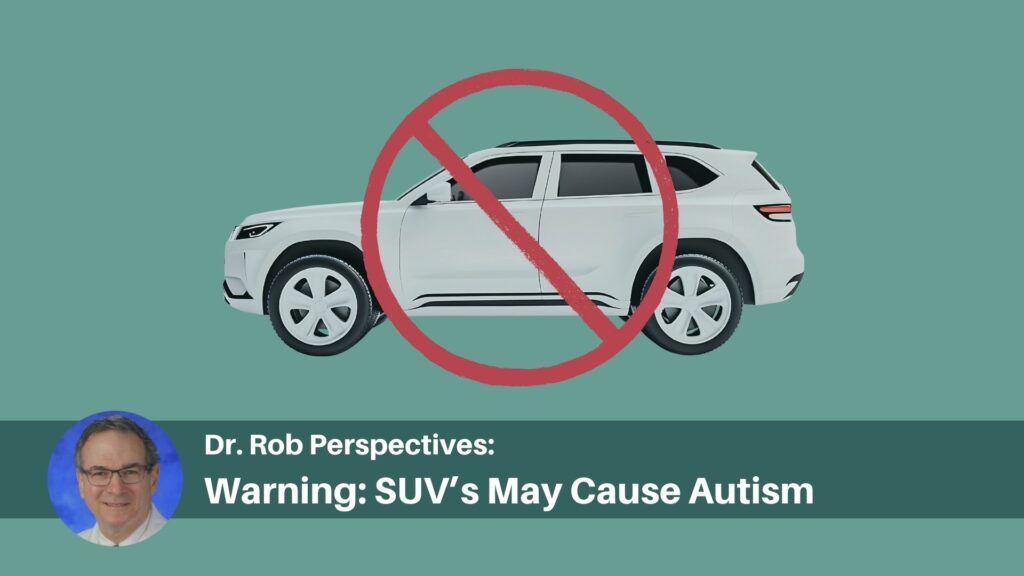
SUVs May Cause Autism: Is it Causation or Correlation?
“SUVs, Tylenol, and Autism: A Playful Lesson in Correlation vs. Causation”
Setting the Scene: SUVs and Autism
Let’s dive into a fun little scenario. Suppose we notice that many families who own SUVs also have a child with autism. We look closer and find that most children with autism go to their appointments in an SUV. We also notice that most athletes are driven to games in SUVs. Does that mean buying an SUV causes autism or increase someone’s chance at participating in an athletic youth team sport? Many others arrive in a sedan but more and more come in an SUV. No it doesn’t mean much of anything. It’s just a classic case of probable unrelated things happening at the same time without one causing the other.
Dr. Rob’s Review: Correlation, Not Causation
As Dr. Rob, Chief Medical Officer at The Force for Health Network, many people ask me my opinion. I’ve looked at the data being talked about with Tylenol and autism. It’s clear that while there is a correlation, we don’t have proof of causation. It takes a sophisticated and time-consuming study to prove causation, and a gut feeling or improper interpretation to blame something on a mere correlation. SUV’s correlate with autism, but don’t cause it, just like having an SUV doesn’t improve your athletic performance, yet both are on the rise as is the diagnosis of autism.
Real-World Numbers: SUVs, Autism, and TikTok
Let’s throw in some real numbers for fun. According to car registration data in the U.S., from around 2013 to 2025, the SUV market grew significantly. Where maybe 1 in 10 families had an SUV before, now it might be around 1 in 3. Similarly, autism diagnoses have changed over time. The numbers used to be roughly 1 in 134 children: now it’s around 1 in 31. These are both going up dramatically. One part of this is that we have more broadly defined what behaviors define the diagnosis of autism and have trained a generation of doctors to recognize it. In my entire career I never diagnosed in, in part because I was never trained to do so.
And hey, at the same time, let’s talk about social media: TikTok went from zero users to millions in the same decade. Does that mean pregnant women scrolling or TikTok watching You Tube causes autism. Of course not! It’s just another reminder that many trends rise at the same time, and we have to be careful not to confuse coincidence with cause.
The Role of Confounding Factors
Why is that important? Well, we know that other things—like high fevers, infections during pregnancy (think flu, COVID, even Zika)—can influence neurological development. And those making decision that may be my age, might remember when thalidomide was shown to cause birth defects. They may be clearly worried that by notting acting now, they may be causing another epidemic of a condition. In my opinion, they errored by interpreting the data to suggest causation, and potentially causing other problems with use of no medication for fever, or use of other medicines that also have known side effects.
A good scientific study looks at confounding factors, genetics, fevers, SUV ownership, other meds, changes in diagnosis all need to be considered and controlled for and the data needs to be re-evaluated to see if there is still a relationship before making big claims. And that’s a great lesson for all of us.
When Announcements Move Markets – A Note on Financial Correlations
Its more than medical implications. Companies may be hurt. Jobs lost, and women may suffer more than necessary in a pregnancy.
To add another layer of nuance, let’s consider how financial markets can be influenced by mere hints of causation. Imagine a scenario where a high-level government official suggests there might be a risk tied to a popular product. Even before anything is officially announced, just the rumor can cause the company’s stock price tumbling. If someone had insider knowledge of that announcement, they could potentially profit by betting against the stock (a practice known as short selling). If the policy is reversed or the message, is revised with a less dramatic message, the stocks predictably would go back up.
This isn’t to accuse anyone of wrongdoing, but it’s a reminder that correlations can also emerge in the financial world. For example, one might remember recently when tariffs were announced and then quickly withdrawn, the market swung wildly, allowing those in the know to potentially profit with shorts on the way down and with purchase at a low price just before policies changed with lower tariffs and it went up In the same vein, if people believe a certain product is about to be labeled risky, stock prices can be influenced by the mere suggestion.
So, in a broader sense, it’s always wise to be a little skeptical. Just like with health data, we should be careful to separate coincidence from real cause—and in the world of finance, to ensure that no one’s using inside information to create or take advantage of artificial causation where none really exists.
In short: As Dr. Rob, I’ve reviewed the studies, and while we see patterns, like more SUVs, more autism diagnoses, and yes, even more TikTok, none of these trends prove one is causing the other. Sometimes, it’s just coincidence, and we must be careful not to mix up correlation with causation.







